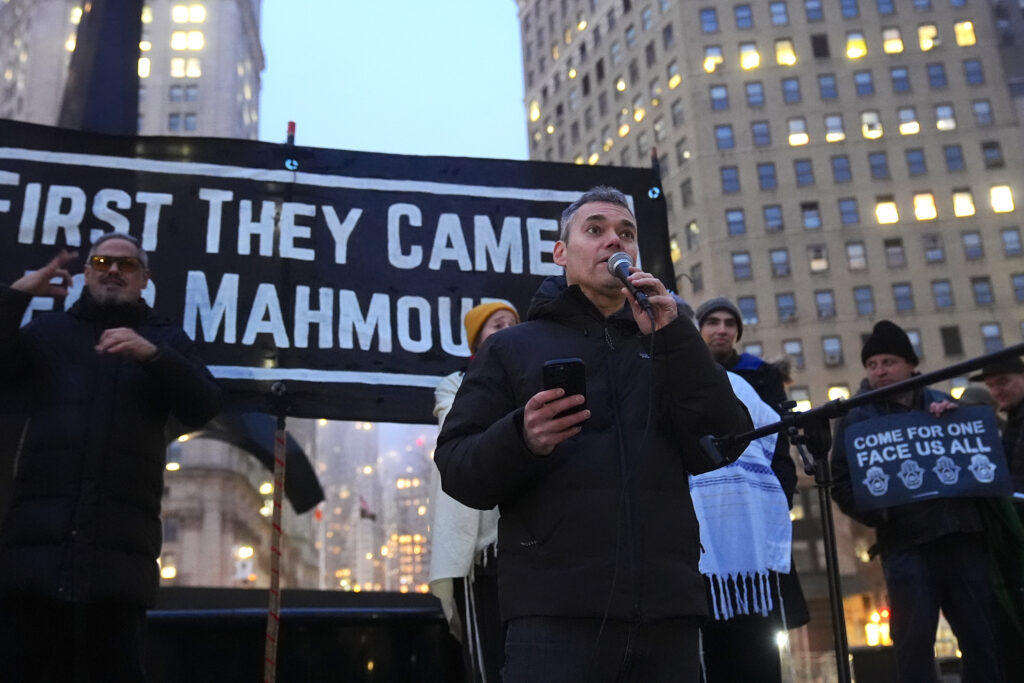As Witness and Prophet

One balmy evening in mid-March, I went to the SoHo Playhouse in downtown New York to watch a debate about Israel’s treatment of the Palestinians between the journalist and political commentator Peter Beinart and Michael Rubin, a fellow at the American Enterprise Institute. Perhaps because the two had been college friends, Rubin refrained from calling Beinart a “kapo,” a “self-hating Jew,” or any of the other names that right-wing Jews frequently sling at Beinart. But being outmatched on the facts (to say nothing of charisma), Rubin did what right-wingers do when confronted with the truth of Israel’s brutal treatment of the Palestinians: Lie and change the subject.
He played the role of apparatchik to perfection. He consistently exaggerated Israel’s alleged beneficence toward the Palestinians—among other things, by imagining peace deals that were never on offer. And his brand of “whataboutism” was impressive. He namechecked at least a dozen countries whose policies toward minorities allegedly made Israel’s look good. My favorite bit was Rubin’s response to Beinart’s pointing out that Israel’s treatment of Palestinians in the West Bank had been called “apartheid” by Amnesty International, Human Rights Watch, the Israeli nonprofits Yesh Din and B’Tselem, as well as a number of ex-Israeli prime ministers and intelligence chiefs: He cited, I kid you not, the fact that back in the 1970s, the American Friends Services Committee had profoundly misjudged the genocidal aims of Cambodia’s Khmer Rouge. Therefore, went his argument, to hell with all human rights groups’ reports.
Beinart had to know that in any event the hipster crowd would be with him, and when the Oxford Union–style vote was taken, he carried 70 percent of the crowd. This was not so shocking given how young people, especially young urban people, even young urban Jewish people, have turned against Israel in recent years. But what of what is politely called “the real world?”
Beinart has traveled considerable distance from his days as the boy-wonder editor of Marty Peretz’s ultra-Zionist the New Republic, followed by a stint at the Council on Foreign Relations and The Atlantic, among other places. Ten years ago, when he first called the American Jewish establishment on the carpet for its willful blindness to the effects of demanding young Jews’ unquestioning fealty to Israel, he became what one magazine profile has called “the American Jewry’s communal gadfly of record.” Beinart has continued to travel leftward during those years. While he still appears regularly on the progressive edge of the New York Times op-ed page, he is no longer welcome in most establishment fora and instead occupies a unique space as the Palestinian movement’s most prominent, and almost certainly, most effective observant Jewish voice in the United States. He is also often published in the Guardian, Jewish Currents (which is intensely critical of Zionism), and his own extremely lively Substack, The Beinart Notebook, where he interviews a wide range of people on related issues, from Bret Stephens to Noam Chomsky (as well as your author). His success is due in part to his enviable talent as a writer, but also to his ability to project a calm and reasonable demeanor in both his writing and his personal appearances—something that is nearly as rare in the Israel/Palestine discourse as cold fusion in nuclear science.
In many ways, the reaction to Beinart’s recent book, Being Jewish After the Destruction of Gaza: A Reckoning, demonstrates important truths in his argument: He relies on his religious training and beliefs to show that many American Jews’ “idolatry” of the state of Israel is actually contradicted by many teachings in both the Torah and the Talmud, and by the rabbis who, for centuries, have interpreted those texts. In one of the more sensitive discussions of the book, the much-admired Jewish historian David N. Myers—whose own talk with Beinart in February had to be moved off the UCLA campus, where Myers teaches—accurately described it in The Markaz Review as a cri du coeur and “an expression of Beinart’s deep pain and exasperation that Jews have failed to acknowledge the monumental devastation and suffering that Israel has wrought in Gaza—which he has publicly described as a genocide.”
Myers went on to summarize its portrayal of “a Manichean world” in which “supporters of Israel see anything that the state does, including in Gaza in 2023–2024, as legitimate, and conversely, anything that Palestinians do in support of their quest for freedom as illegitimate and immoral.” Shortly before the talk was held and Myers’s review was published, Betar USA, the American branch of the far-right Israeli movement, posted on social media: “We urge all Jews on the Upper West Side to give Peter Beinart a pager. He is a traitor, a kapo and we must oppose him.” The message came pretty close to incitement to murder, considering that last September Israel killed and maimed several thousand suspected Hezbollah operatives in Lebanon by way of explosive pagers and walkie-talkies.
Beinart today calls himself a “cultural Zionist,” in the mode of the late 19th–early 20th century Hebrew journalist and essayist Ahad Ha’am, who saw a Jewish homeland in Palestine as a place that would give birth to a renaissance of Jewish thought and community without necessarily requiring the trappings (or responsibilities) of statehood. Yet there is a Jewish state today, and Beinart’s arguments that it should be transformed into a joint Jewish/Palestinian democratic state are understood by those on the “pro-Israel” side to be indistinguishable from the position traditionally put forward by the Palestine Liberation Organization and those who view international relations from a “realist” perspective—with which I identify, at least its liberal subset—to be akin to the same fantasy that has (disastrously) animated Palestinian politics since the Nakba of 1948. As the anthropologist Lori Allen wrote in Jacobin earlier this year, Beinart’s “public journey toward a foundational critique of Israel and commitment to Palestinian liberation has been heartening for those Palestinians and their allies who see winning over the American Jewish community as vital.”
No doubt Beinart’s arguments are convincing to many American Jews since many were already predisposed to embrace his views. In a 2021 poll by the Jewish Electoral Institute, 34 percent of American Jewish respondents agreed with the statement, “Israel’s treatment of Palestinians is similar to racism in the United States,” and 38 percent of those under 40 agreed that “Israel is an apartheid state.” In a May 2024 survey by the Jerusalem Center for Security and Foreign Affairs, over half of American Jewish respondents said they supported withholding certain weapons from Israel and fully one-third said that Israel was committing genocide in Gaza. One can be confident that both those numbers have risen significantly since then.
Where these attitudinal changes lead in terms of changes in U.S. or Israeli policies, however, is murky at best. In addition to Beinart’s harsh assessment of Israel’s behavior (which I share), his book contains a series of transformative proposals that any realist (including this one) cannot take seriously save as thought experiments. He might have done better to posit them as such rather than as measures that Israeli Jews ought to adopt, because as he well knows, Israelis are rapidly moving in a far different direction.
Yet because of the unique emotional intensity that suffuses virtually discussion of Israel and Palestine, Beinart’s critics seem compelled to address his proposals as if the very fact that he has imagined them somehow threatens to bring them into being. At Beinart’s left is Azad Essa, a reporter for Middle East Eye, who has argued that “his insistence to gently equivocate that both sides have made mistakes or struggled or need to prioritise engagement when one side is urgently protesting for an end to a genocide—openly supported and lobbied for by the other” makes his argument “simply untenable.”
The claim goes way overboard. Essa quotes Siraj Ahmed, a professor at the CUNY Graduate Center, where Beinart also teaches, as saying of Beinart, “He’s not acknowledging that what is intrinsic to the Zionist presence on the land is racism.” And Essa wonders, perhaps understandably, “how Beinart expects Zionists—raised on a diet of racism and hatred towards Palestinians—to relinquish supremacy in Israel while simultaneously believing in a special biblical connection to the land.” Personally, I would not use these words, but the question of what Beinart is actually doing with this book is not necessarily a hostile one.
In the (considerably more crowded) opposite corner of the ultra-Zionist far right, there is, in Jewish News Syndicate, the American-Israeli journalist Yisrael Medad, who finds Beinart guilty of “adopting and promoting extreme, radical and dangerous positions vis à vis Israel” and wonders: “Could this act and so many more be the result of left-wing progressive antisemitism or Muslim Jew-hatred? Or does his pro-Palestinianism blind him to the incidentals of the day?”
Neville Teller, a longtime contributor to BBC Radio, wrote in the Jerusalem Post that Beinart’s book is “filled with skewed anti-Israel, anti-Jewish arguments that demand to be challenged by upholders of truth and justice.” His many accusations against the author include that “he even goes so far as to justify Hamas’s strategy of embedding itself within the civilian structure of the Gazan population” and fails to acknowledge “the challenges posed by an adversary that rejects Israel’s very existence and openly seeks its destruction.”
The journalist and NYU scholar of Zionism Susie Linfield argued in Quillette that “Beinart’s project, bluntly stated, is the dismantling of a state for the Jewish people—under any government, within any borders.” She mocked his advocacy for (in her words) “a ‘binational’ state with an Arab majority (which the ‘right of return’ would produce), in which the Jews would presumably be a well-protected, flourishing, and even cherished minority.” Linfield has every right to submit Beinart’s endorsement of a one-state solution to a pragmatic critique, and judged on these terms, she scores heavily and so I quote her at length:
Peter Beinart has written hundreds of thousands of words advocating a “democratic binational state.” It is time for him to answer some questions. How would such a state be formed, since most Israelis adamantly oppose it? Why would the right of return—which Israelis from across the political spectrum oppose, and which has been an insurmountable stumbling block in peace negotiations—lead to “greater … reconciliation”? Israelis are a notably fractious people who have never written a constitution; how would they write one in alliance with another people whose political history and institutions are quite different? What would the status of women be? Would LGBTQ rights be protected? Would the state be secular, and if so in what sense? Would Hamas, Islamic Jihad, the al-Aqsa Martyrs Brigades, and other terror militias be incorporated into the Israeli armed forces (or vice versa)? What would the state’s foreign policy be? What kind of legal system would it have? Who would keep the peace among hostile factions? What would happen to those—whether Israeli or Palestinian—who opposed the binational project? Most of all, who would decide all this, and how?
But perhaps there is really only one germane question, which underlies the others: How can two peoples, who have been killing each other for a hundred years—and who, especially at this moment, hate and fear each other as never before—join together in a peaceful, democratic union?
Linfield is not wrong here: Beinart’s suggestions for a single binational state for Jews and Palestinians strike me as every bit as impractical as they do her. Where she and I differ, however, is over what so many people who cling to the “liberal Zionist” label would prefer to elide. It is true that the two-state solution, which Linfield supports, may be the only solution imaginable to the conflict, but—thanks largely to Israel’s de facto annexation of much of the West Bank, its occupation of whatever parts of Gaza it chooses, its recent land grabs in both Syria and Lebanon, and its general transformation into an illiberal democracy under a right-wing, theocratic, and racist government—that option has become hardly more imaginable than Beinart’s utopian vision.
The Guardian columnist Jonathan Freedland, an observant Jew and one of the most eloquent political columnists in the English language, joined Beinart in April on his weekly Substack discussion to debate his argument. Alas, Freedland’s arguments amounted to merely theoretical possibilities. It was at least theoretically possible for the Palestinians to live in a “Jewish state” as equals. A two-state solution remained “theoretically” possible. But thanks to the simultaneously hawkish, theocratic, and illiberal tendencies that have come to dominate Israeli political culture, these possibilities have now receded into near invisibility.
Twenty months after Israel launched its horrific siege on the people of Gaza in response to the Oct. 7, 2023, terrorist attack by Hamas and its allies, it is expanding its war and implementing what gives every indication of becoming yet another endless (and endlessly brutal) military occupation. As Beinart pointed out in a conversation in February with The New Yorker’s Isaac Chotiner, in a 2024 vote in Israel’s Knesset on a two-state solution, “not a single member of a Jewish political party in Israel voted yes.” Almost all mainstream Democratic politicians, liberal-ish pundits, and leaders of Jewish organizations profess to support the option. Yet precious few have ever demanded that Israel stop undertaking actions specifically designed to make that outcome impossible, especially its continued annexation of territory, which will only ensure that any future Palestinian state—if there is ever to be one—will be little more than a collection of economically unsustainable, politically defenestrated, barely functional Bantustans.
In the view of many on the ground, both in Israel and what we call “Palestine,” Israel has successfully turned the words “two-state solution” into a cover for a second, slow-motion, Nakba. At the end of May, Israel announced that it would be creating 22 more settlements in the West Bank, and its settlers were continuing to attack Palestinians and rampage their homes with few, if any, consequences from law enforcement or the Israel Defense Forces. Israel is also now planning the permanent re-occupation of at least half of Gaza. It’s not clear exactly when the possibility for meaningful sovereignty for the Palestinians was finally foreclosed, but as painful and difficult as this is to contemplate for those who have dedicated themselves to a just peace between these two peoples, that day is long behind us. (Earlier this week, President Donald Trump’s ambassador to Israel, the evangelical Christian Mike Huckabee, announced that the U.S. would no longer even pretend to support the creation of a Palestinian state.)
Beinart admits that his prescription for achieving justice for the Palestinians and peace for both sides can be difficult to imagine. I’m afraid I share the pessimism embodied in his remarks to Chotiner: “If you had to put a gun to my head and ask me what I think is the most realistic likelihood that we will see over the coming decades and generations,” he said, “it would be what I would call an American-style solution to the Palestinian question. By which I mean the nineteenth-century American solution to Native Americans. You just continue this process and it grinds away without restraint until basically the population is destroyed as a functioning political entity.”
Aside from its (valuable) lessons in scripture, what I find most interesting about Beinart’s book—together with the recent works of Pankaj Mishra, The World After Gaza: A History, and Ta-Nehisi Coates, The Message—is the reaction it has inspired. Being Jewish After the Destruction of Gaza was published by the extremely prestigious Alfred A. Knopf house and made it briefly onto the Times best-seller list. Beinart has been treated to respectful treatment in prestige publications, cable TV, and public radio, as well as in much of the Jewish press, to a degree that was almost never accorded, say, Noam Chomsky or Edward Said in the days when they were the lone pro-Palestinian experts whom almost any mainstream reporter felt safe in quoting. Today, on his weekly Substack, he lists so many media and personal high-profile media appearances, including a smattering of synagogues, it’s a wonder he has any time left to teach and write. His book, in addition to making the Times list, was assigned by the paper’s Book Review section to Benjamin Moser, who was certain to assess it sympathetically. (Moser, the author of a Pulitzer Prize–winning biography of Susan Sontag, wrote in the Nation during the 2024 U.S. election that he was “still open to voting” for Kamala Harris but only if she did a better job of addressing the war in Gaza.)
It was not so long ago that almost all major media organs—led by the Times; including the New Republic—would have taken to the kind of character assassination that even the mildest critics of Israel receive from the right-wing precincts of the Jewish press. When John J. Mearsheimer and Stephen M. Walt’s The Israel Lobby and U.S. Foreign Policy was published in 2008, the authors had enjoyed impeccable establishment credentials. But after that book, and a related working paper and an essay in the London Review of Books, they were called “crackpots” (Martin Peretz), “smelly” (Christopher Hitchens), as “scholarly” and “just as nutty” as Joseph McCarthy (Max Boot), and “liars” and “bigots” comparable to “Pat Buchanan, David Duke, Noam Chomsky, and some of the less intelligent members of Hamas” (Alan Dershowitz). For the diplomatic historian Andrew Preston, though, the most “remarkable” aspect of the entire affair was “just how, well, unremarkable it is.” As Preston noted: “Mearsheimer and Walt argue that politically active pro-Israel Americans have dominated debate within the United States to such an extent that they have made it all but impossible for America to be even-handed in the Middle East. For anyone who has followed U.S. politics and foreign policy of the last forty years, even if only in passing, this is not exactly breaking news.”
Much has changed in the ensuing years, especially in Israel’s conduct toward the Palestinians, which has grown ever harsher and more punitive (even leaving aside Gaza), and in the role that Israel has come to play in the imagination of American Jews. Once a source of great pride, Israel now is for many a source of considerable anguish. But there is also a significant difference in the ambitions of the two works. Walt and Mearsheimer were writing as international-relations realists who couldn’t explain the U.S.’s limitless support for Israel through their theoretical framework and so explored another argument to explain the distortive influence of the pro-Israel lobby. Beinart is doing something else: My view is that he is writing as both a witness and a kind of prophet, and he does so quite well. I think it would take a miracle for his preferred solution to the conflict to come into being. But it is not impossible that he will inspire those who read his work and see him speak to take actions that will somehow ameliorate Israel’s cruelty—or at least feel solidarity with Jews who share the sense of tragedy Beinart so eloquently expresses.
Eric Alterman is a CUNY Distinguished Professor of English at Brooklyn College and the author of 12 books, most recently We Are Not One: A History of America’s Fight Over Israel.


